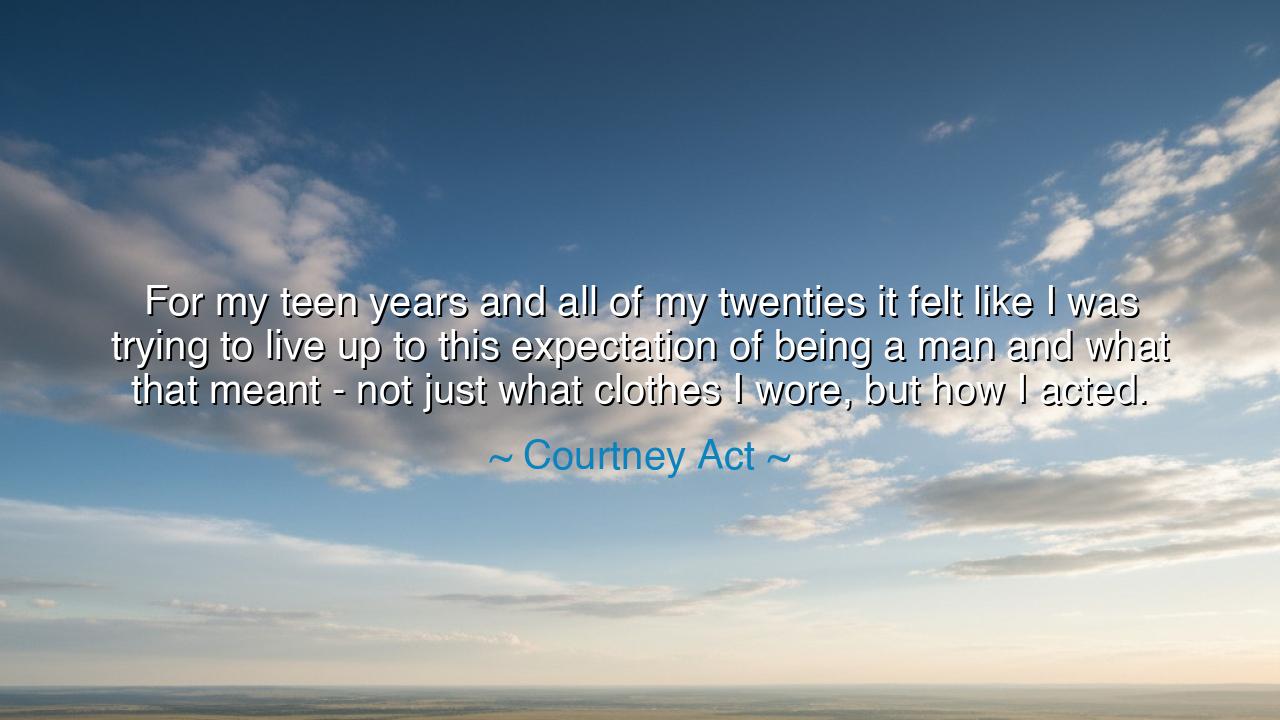
For my teen years and all of my twenties it felt like I was
For my teen years and all of my twenties it felt like I was trying to live up to this expectation of being a man and what that meant - not just what clothes I wore, but how I acted.






When Courtney Act declared, “For my teen years and all of my twenties it felt like I was trying to live up to this expectation of being a man and what that meant—not just what clothes I wore, but how I acted,” they voiced an ancient struggle: the weight of imposed identity. These words speak not only of gender, but of the endless battle between the self as it is and the self as the world demands. From the earliest days, societies have carved rigid molds, declaring to each child, “This is what you must be.” Yet the spirit is often larger, freer, more radiant than the mold allows.
The expectation of being a man is not a simple garment one can put on or take off. It is a burden woven from generations: be strong, be silent, be hard, be unyielding. It dictates posture, language, desires, even the very rhythm of breath. For Courtney Act, as for countless others, youth became not a celebration of discovery but a rehearsal for conformity, each gesture measured against a script not of their own writing. Here lies the meaning: the truest suffering is not from the judgment of others, but from the silencing of one’s own authentic voice.
History resounds with such struggles. Recall the Roman emperor Hadrian’s beloved, Antinous, who defied expectations of masculine hardness by becoming a symbol of beauty, softness, and devotion. His image, carved in marble across the empire, was celebrated not for martial might, but for grace. And yet, how many unnamed before him, and after him, lived unseen—forced to wear masks of strength when their souls longed for tenderness? Courtney’s words remind us of these multitudes, of all who have been pressed into armor that did not fit.
The mention of clothes is no small thing, for garments are symbols of identity. They are banners we carry into the world, declaring who we are—or who we are told to be. But Act points deeper: beyond cloth lies conduct, beyond fashion lies performance. To be told not only how to dress but how to laugh, how to walk, how to desire, is to be bound in chains invisible yet heavy as iron. And yet, within this confession is also a spark of triumph: by naming the struggle, they loosen its hold. What was hidden in silence is broken by voice.
From these words we draw the lesson: beware the prisons of expectation. Whether they be of manhood, womanhood, success, beauty, or strength, they are but shadows cast by tradition and fear. To live only to satisfy them is to exile the self from its own kingdom. But to resist, to question, to carve your own meaning—this is the act of courage, this is the rebellion that sets the soul free.
Practical actions flow from this truth. First, examine the expectations you carry—ask, “Are these truly mine, or were they given to me by voices not my own?” Second, clothe yourself, both in fabric and in action, in ways that bring joy rather than fear. Third, extend this freedom to others: do not bind them with your own expectations, but bless them to walk in theirs. In this way, the chains of conformity weaken, link by link, across generations.
Thus, Courtney Act’s words stand not as a lament alone, but as a beacon. They remind us that identity is not a costume forced upon us but a tapestry we weave from within. To live authentically is no small task—it is a hero’s work, a pilgrimage through doubt, shame, and resistance. But those who undertake it, like Act, leave behind a path for others to follow, a path toward wholeness, dignity, and the radiant joy of being truly oneself.






AAdministratorAdministrator
Welcome, honored guests. Please leave a comment, we will respond soon